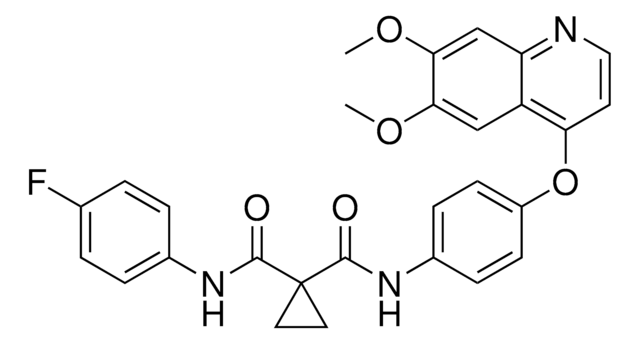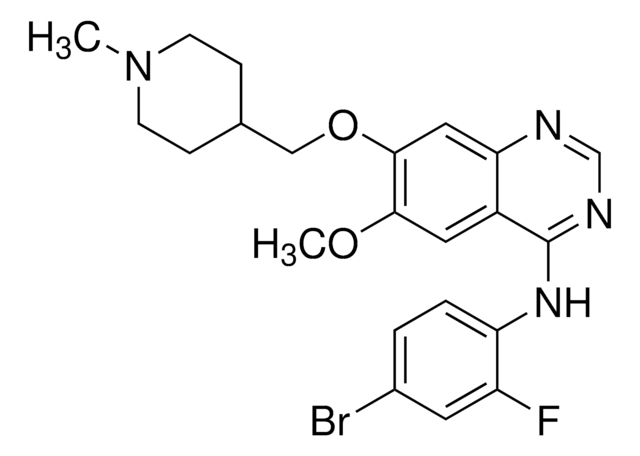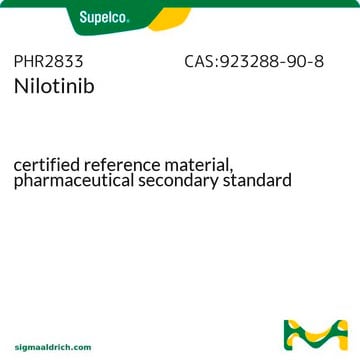SML3915
Cabozantinib malate
≥98% (HPLC)
别名:
BMS 907351 (S)-malate, BMS-907351 (S)-malate, BMS907351 (S)-malate, Cabozantinib (L)-malate, Cabozantinib (S)-malate, N-(4-(6,7-Dimethoxyquinolin-4-yloxy)phenyl)-N’-(4-fluorophenyl)cyclopropane1,1-dicarboxamide, (2S)-hydroxybutanedioate, N-(4-{[6,7-bis(Methyloxy)quinolin-4-yl]oxy}phenyl)-N′-(4-fluorophenyl)cyclopropane-1,1-dicarboxamide (L)-malate salt, XL 184 (S)-malate, XL-184 (S)-malate, XL184 (S)-malate
登录查看公司和协议定价
所有图片(2)
About This Item
经验公式(希尔记法):
C28H24FN3O5·C4H6O5
CAS号:
分子量:
635.59
MDL號碼:
分類程式碼代碼:
12352200
NACRES:
NA.77
推荐产品
生化/生理作用
Orally active, potent receptor tyrosine kinase inhibitor against VEGFR2 (KDR), MET, KIT, RET, AXL, TIE2, and FLT3 with anti-tumor efficacy in vivo.
Cabozantinib (XL184; BMS‐907351) is an orally active, potent inhibitor against multiple receptor tyrosine kinases, notably VEGFR2/KDR (IC50 = 35 pM), MET (IC50 = 1.3 nM/wt, 3.8 nM/Y1248H, 11.8 nM/D1246N, 14.6 nM/K1262R), KIT, RET, AXL, TIE2, and FLT3 (IC50 = 4.6, 5.2, 7, 14.3, and 11.3 nM, respectively). Cabozantinib inhibits MET-driven proliferation in cancer cultures (IC50 = 9.9 nM/Hs746T, 19 nM/SNU-5) and simultaneously suppressing metastasis, angiogenesis and tumor growth in vivo (3-100 mg/kg via single or daily p.o. to mice with human MDA-MB-231 xenograft, 1-60 mg/kg via single or daily p.o. to rats with C6 rat glioma).
Cabozantinib (XL184; BMS‐907351) is an orally active, potent inhibitor against multiple receptor tyrosine kinases, notably VEGFR2/KDR (IC50 = 35 pM), MET (IC50 = 1.3 nM/wt, 3.8 nM/Y1248H, 11.8 nM/D1246N, 14.6 nM/K1262R), KIT, RET, AXL, TIE2, and FLT3 (IC50 = 4.6, 5.2, 7, 14.3, and 11.3 nM, respectively). Cabozantinib inhibits MET-driven proliferation in cancer cultures (IC50 = 9.9 nM/Hs746T, 19 nM/SNU-5) and simultaneously suppressing metastasis, angiogenesis and tumor growth in vivo (3-100 mg/kg via single or daily p.o. to mice with human MDA-MB-231 xenograft, 1-60 mg/kg via single or daily p.o. to rats with C6 rat glioma).
注意
Hygroscopic
訊號詞
Danger
危險分類
Eye Dam. 1 - Repr. 1B - Skin Irrit. 2 - STOT RE 2
標靶器官
Bone marrow,Kidney,Endocrine system,Gastrointestinal tract,Liver
儲存類別代碼
6.1C - Combustible acute toxic Cat.3 / toxic compounds or compounds which causing chronic effects
水污染物質分類(WGK)
WGK 3
Cabozantinib: A Multitargeted Oral Tyrosine Kinase Inhibitor
Pharmacotherapy, 38(3), 357-369 (2018)
Cabozantinib Enhances Anti-PD1 Activity and Elicits a Neutrophil-Based Immune Response in Hepatocellular Carcinoma
Clinical Cancer Research, 28(11), 2449-2460 (2022)
F Michael Yakes et al.
Molecular cancer therapeutics, 10(12), 2298-2308 (2011-09-20)
The signaling pathway of the receptor tyrosine kinase MET and its ligand hepatocyte growth factor (HGF) is important for cell growth, survival, and motility and is functionally linked to the signaling pathway of VEGF, which is widely recognized as a
我们的科学家团队拥有各种研究领域经验,包括生命科学、材料科学、化学合成、色谱、分析及许多其他领域.
联系技术服务部门








